
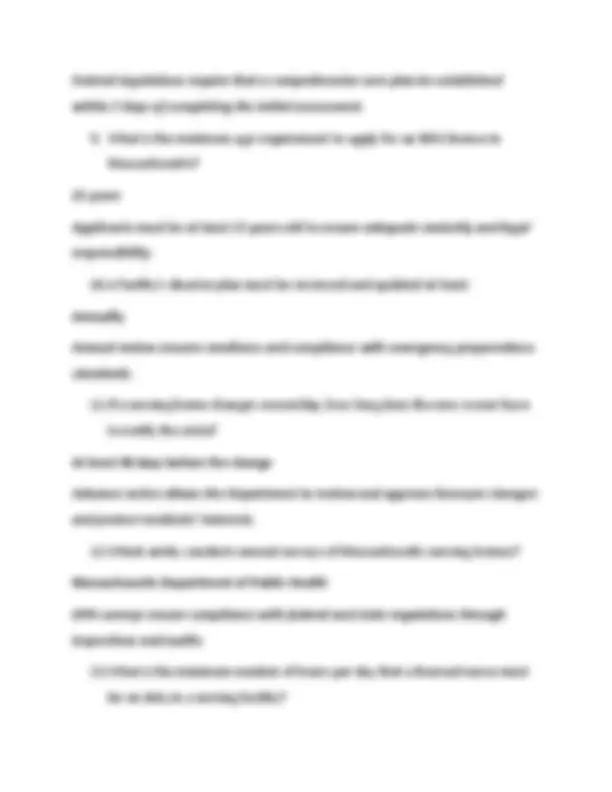
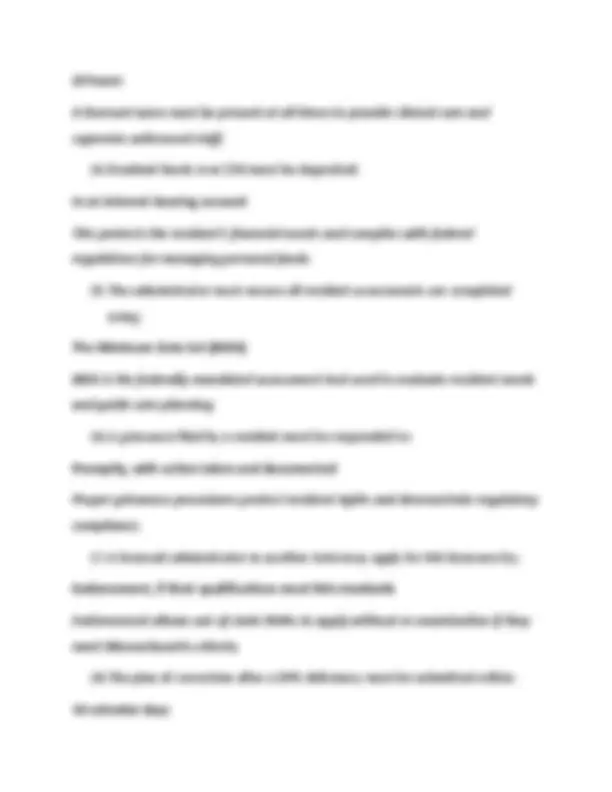
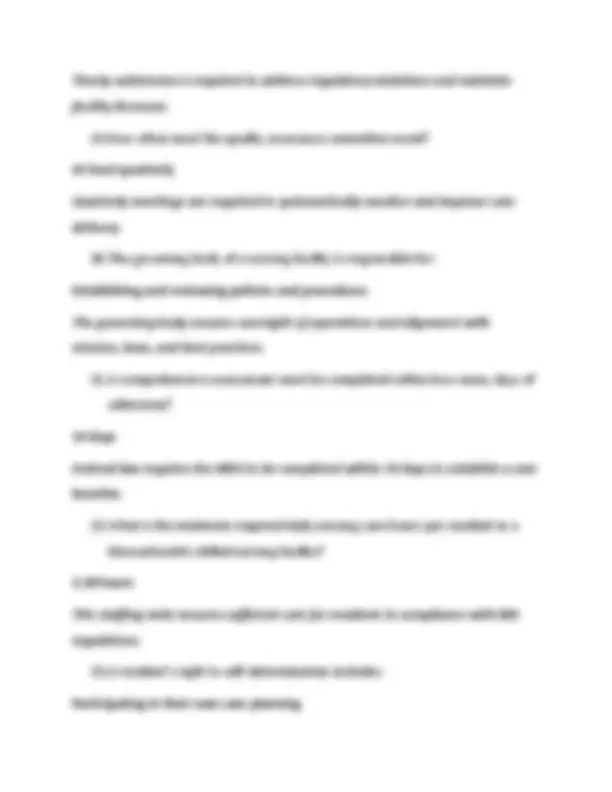
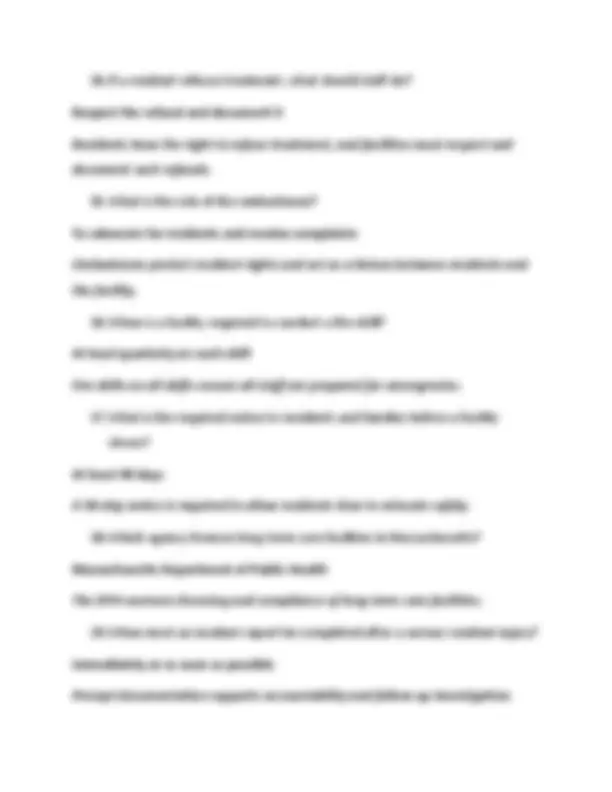
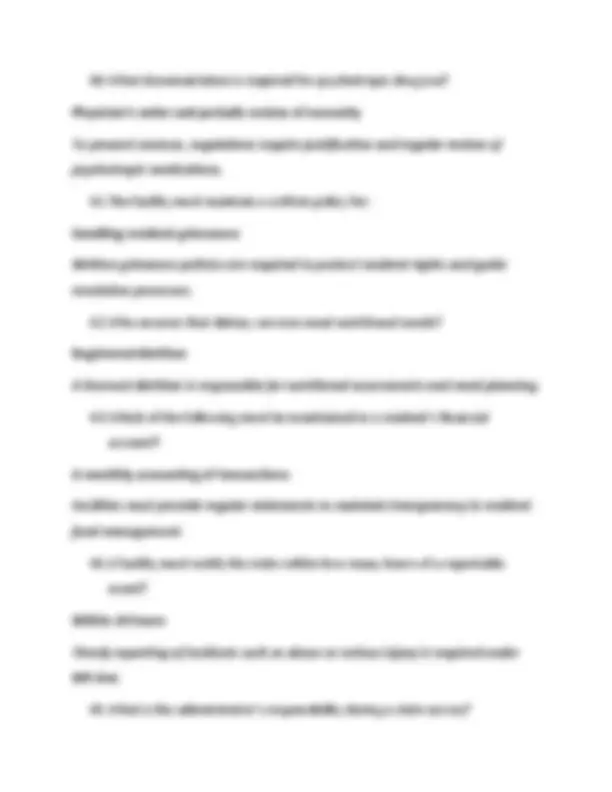
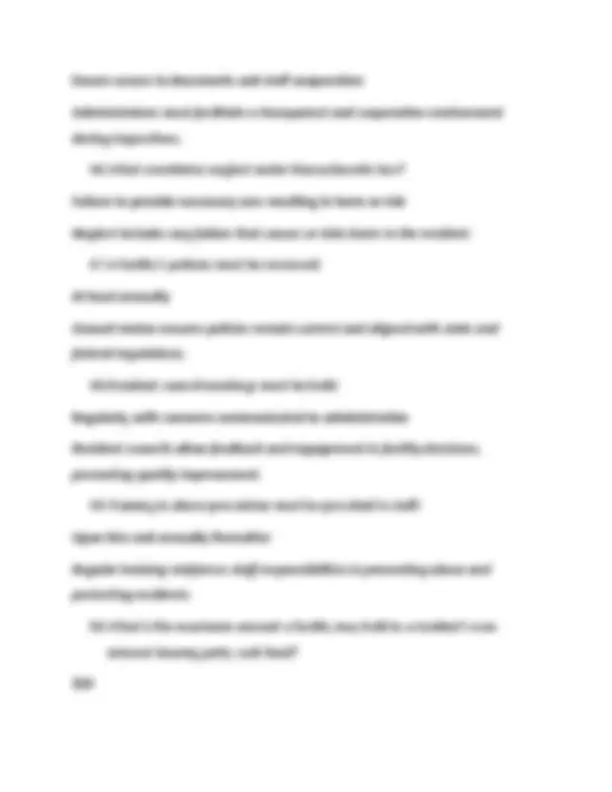
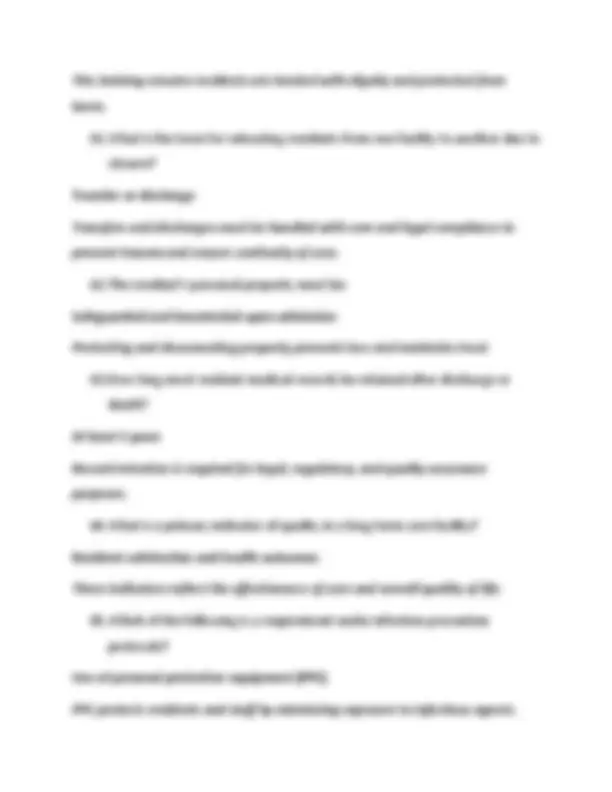
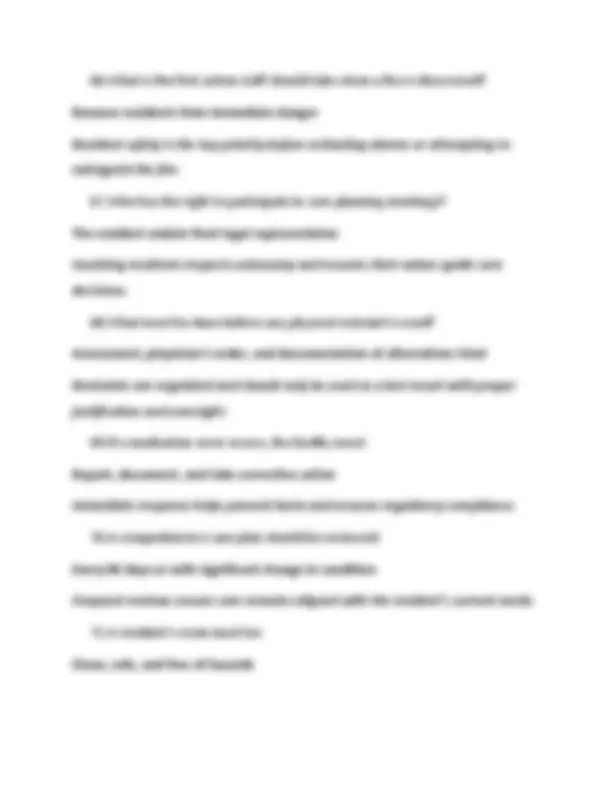
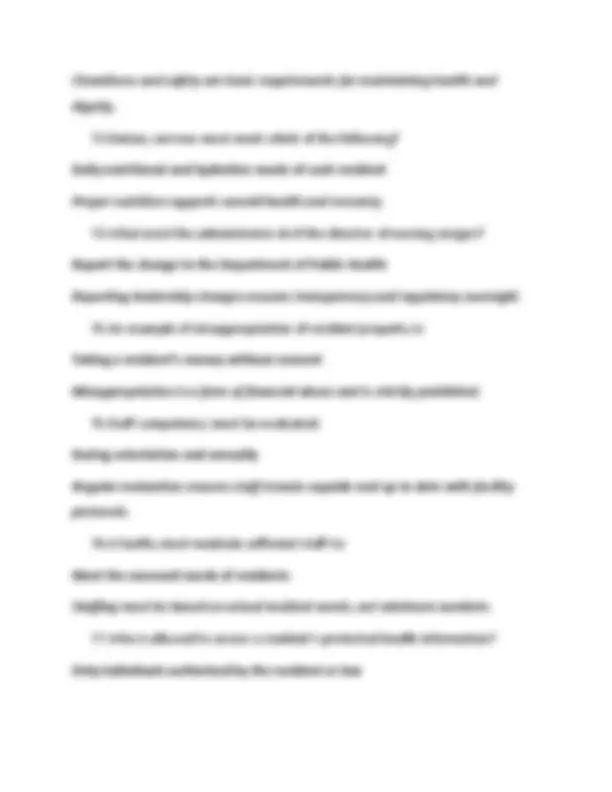
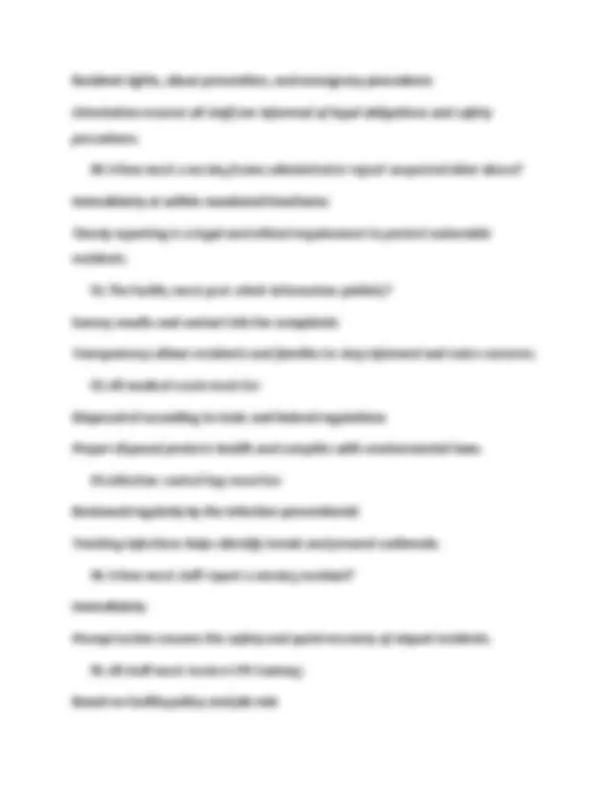
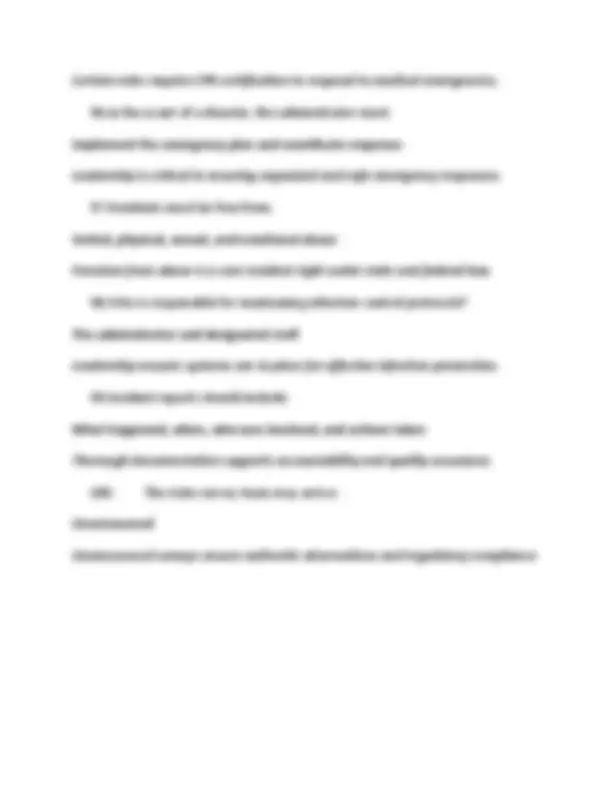


Study with the several resources on Docsity

Earn points by helping other students or get them with a premium plan


Prepare for your exams
Study with the several resources on Docsity

Earn points to download
Earn points by helping other students or get them with a premium plan
Community
Ask the community for help and clear up your study doubts
Discover the best universities in your country according to Docsity users
Free resources
Download our free guides on studying techniques, anxiety management strategies, and thesis advice from Docsity tutors
Massachusetts – MA Board of Registration of Nursing Home Administrators licensing exam Questions And Correct Answers (Verified Answers) Plus Rationales 2025 Q&A | Instant Download
Typology: Exams
1 / 19

This page cannot be seen from the preview
Don't miss anything!












40 hours over two years The MA Board requires 40 CEUs to maintain administrator competency and promote ongoing professional development.
2 4 hours A licensed nurse must be present at all times to provide clinical care and supervise unlicensed staff. 14.Resident funds over $50 must be deposited: In an interest-bearing account This protects the resident’s financial assets and complies with federal regulations for managing personal funds. 15.The administrator must ensure all resident assessments are completed using: The Minimum Data Set (MDS) MDS is the federally mandated assessment tool used to evaluate resident needs and guide care planning. 16.A grievance filed by a resident must be responded to: Promptly, with action taken and documented Proper grievance procedures protect resident rights and demonstrate regulatory compliance. 17.A licensed administrator in another state may apply for MA licensure by: Endorsement, if their qualifications meet MA standards Endorsement allows out-of-state NHAs to apply without re-examination if they meet Massachusetts criteria. 18.The plan of correction after a DPH deficiency must be submitted within: 10 calendar days
Timely submission is required to address regulatory violations and maintain facility licensure. 19.How often must the quality assurance committee meet? At least quarterly Quarterly meetings are required to systematically monitor and improve care delivery. 20.The governing body of a nursing facility is responsible for: Establishing and reviewing policies and procedures The governing body ensures oversight of operations and alignment with mission, laws, and best practices. 21.A comprehensive assessment must be completed within how many days of admission? 14 days Federal law requires the MDS to be completed within 14 days to establish a care baseline. 22.What is the minimum required daily nursing care hours per resident in a Massachusetts skilled nursing facility? 3.58 hours This staffing ratio ensures sufficient care for residents in compliance with MA regulations. 23.A resident’s right to self-determination includes: Participating in their own care planning
Assessment, plan of care, treatment, and progress notes Comprehensive documentation ensures continuity of care and legal compliance. 29.Who must sign the plan of care? Interdisciplinary team and the resident or their representative This shows collaborative care planning and respects resident autonomy. 30.In Massachusetts, an infection preventionist must be: A trained healthcare professional designated by the facility To manage infection control, the infection preventionist must have specialized training and facility authorization. 31.What is the primary purpose of the MDS (Minimum Data Set)? To assess resident status and develop individualized care plans The MDS is a key component in care planning and ensures regulatory compliance. 32.An advanced directive must be: Respected and implemented by facility staff Federal law requires facilities to honor residents’ advance directives regarding healthcare decisions. 33.Abuse allegations must be investigated: Immediately and reported within mandated timeframes Prompt investigation protects residents and ensures compliance with elder abuse laws.
34.If a resident refuses treatment, what should staff do? Respect the refusal and document it Residents have the right to refuse treatment, and facilities must respect and document such refusals. 35.What is the role of the ombudsman? To advocate for residents and resolve complaints Ombudsmen protect resident rights and act as a liaison between residents and the facility. 36.When is a facility required to conduct a fire drill? At least quarterly on each shift Fire drills on all shifts ensure all staff are prepared for emergencies. 37.What is the required notice to residents and families before a facility closes? At least 90 days A 90-day notice is required to allow residents time to relocate safely. 38.Which agency licenses long-term care facilities in Massachusetts? Massachusetts Department of Public Health The DPH oversees licensing and compliance of long-term care facilities. 39.When must an incident report be completed after a serious resident injury? Immediately or as soon as possible Prompt documentation supports accountability and follow-up investigation.
Ensure access to documents and staff cooperation Administrators must facilitate a transparent and cooperative environment during inspections. 46.What constitutes neglect under Massachusetts law? Failure to provide necessary care resulting in harm or risk Neglect includes any failure that causes or risks harm to the resident. 47.A facility’s policies must be reviewed: At least annually Annual review ensures policies remain current and aligned with state and federal regulations. 48.Resident council meetings must be held: Regularly, with concerns communicated to administration Resident councils allow feedback and engagement in facility decisions, promoting quality improvement. 49.Training in abuse prevention must be provided to staff: Upon hire and annually thereafter Regular training reinforces staff responsibilities in preventing abuse and protecting residents. 50.What is the maximum amount a facility may hold in a resident’s non- interest-bearing petty cash fund? $
Funds over $50 must be placed in an interest-bearing account to protect residents’ financial interests. 51.What is the primary focus of the Quality Assurance and Performance Improvement (QAPI) program? Continuous quality improvement of resident care and facility operations QAPI ensures a data-driven approach to improving quality of care and services. 52.Which team is responsible for reviewing adverse outcomes and identifying improvement strategies? The Quality Assurance Committee This team evaluates trends, identifies areas for improvement, and implements action plans. 53.How often must each resident's drug regimen be reviewed by a licensed pharmacist? At least once a month Monthly reviews help detect unnecessary drugs, adverse reactions, and promote medication safety. 54.What must a facility do if a resident requests to examine their medical records? Provide access within 24 hours Facilities must comply promptly to respect residents’ rights to access their own health information. 55.Under federal and state law, when must informed consent be obtained?
This training ensures residents are treated with dignity and protected from harm. 61.What is the term for relocating residents from one facility to another due to closure? Transfer or discharge Transfers and discharges must be handled with care and legal compliance to prevent trauma and ensure continuity of care. 62.The resident’s personal property must be: Safeguarded and inventoried upon admission Protecting and documenting property prevents loss and maintains trust. 63.How long must resident medical records be retained after discharge or death? At least 5 years Record retention is required for legal, regulatory, and quality assurance purposes. 64.What is a primary indicator of quality in a long-term care facility? Resident satisfaction and health outcomes These indicators reflect the effectiveness of care and overall quality of life. 65.Which of the following is a requirement under infection prevention protocols? Use of personal protective equipment (PPE) PPE protects residents and staff by minimizing exposure to infectious agents.
66.What is the first action staff should take when a fire is discovered? Remove residents from immediate danger Resident safety is the top priority before activating alarms or attempting to extinguish the fire. 67.Who has the right to participate in care planning meetings? The resident and/or their legal representative Involving residents respects autonomy and ensures their values guide care decisions. 68.What must be done before any physical restraint is used? Assessment, physician’s order, and documentation of alternatives tried Restraints are regulated and should only be used as a last resort with proper justification and oversight. 69.If a medication error occurs, the facility must: Report, document, and take corrective action Immediate response helps prevent harm and ensures regulatory compliance. 70.A comprehensive care plan should be reviewed: Every 90 days or with significant change in condition Frequent reviews ensure care remains aligned with the resident’s current needs. 71.A resident’s room must be: Clean, safe, and free of hazards
HIPAA regulations protect resident privacy and limit access to health information. 78.When can a facility implement emergency involuntary discharge? When the resident poses an immediate threat to others Emergency discharge is allowed in rare, urgent cases with proper documentation and notification. 79.What is the purpose of the pre-admission screening and resident review (PASRR)? To identify individuals with mental illness or developmental disabilities PASRR ensures proper placement and services for residents with specific needs. 80.Which professional must oversee the nursing services in a nursing home? Director of Nursing (DON) The DON ensures appropriate nursing practices, supervision, and care delivery. 81.What does the term "plan of correction" refer to? A facility's strategy to fix cited deficiencies Facilities must outline how they will resolve violations identified during inspections. 82.Fire safety and emergency preparedness policies must be: Written, reviewed, and tested regularly Comprehensive planning ensures staff readiness and resident safety. 83.What role does the governing body play in a facility?
Sets policies and ensures compliance with laws The governing body has ultimate accountability for operations and quality of care. 84.The administrator is expected to: Oversee all departments and ensure regulatory compliance Administrators are responsible for the entire facility’s operation and leadership. 85.What is required when a facility has a new administrator? Notify the state licensing board The MA Board must be informed of any change in administrative leadership. 86.Abuse prevention policies must include: Staff training, investigation protocols, and reporting procedures Clear policies protect residents and guide appropriate responses to abuse. 87.What is the maximum number of residents that may share a room in Massachusetts? Two residents Limiting room occupancy promotes privacy and infection control. 88.What must happen before transferring a resident to another facility? Proper notice, consent, and transfer summary Transfers require communication, planning, and documentation to ensure continuity of care. 89.A new hire’s orientation must include training in:
Certain roles require CPR certification to respond to medical emergencies. 96.In the event of a disaster, the administrator must: Implement the emergency plan and coordinate response Leadership is critical in ensuring organized and safe emergency responses. 97.Residents must be free from: Verbal, physical, sexual, and emotional abuse Freedom from abuse is a core resident right under state and federal law. 98.Who is responsible for maintaining infection control protocols? The administrator and designated staff Leadership ensures systems are in place for effective infection prevention. 99.Incident reports should include: What happened, when, who was involved, and actions taken Thorough documentation supports accountability and quality assurance.